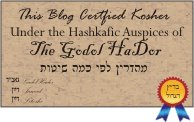Warning from my Brother:
"your phraseology is very strong
too strong for the faint of heart perhaps"תתן אמת ליעקב, חסד לאברהם
אשר נשבעת לאבותינו מימי קדם
You give truth to Ya‘aqov, kindness to Avraham;
as you swore to our ancestors in ancient days.
Trey-‘Asar, Mikha 7:20
Avraham Avinu failed the test.I came to that conclusion in high school.
I haven't been able to shake myself out of it since.
Avraham is supposed to be the epitome of
hhesed — of 'lovingkindess' as fancy old translations have it. He is given that title in the Qabbala, as a representative of the Sphere of
Hhesed, placed in opposition to
Gevura. Kindness before Strength. Mercy before Justice. And it's not like they made this up out of nothing but the fumes of coffee! After all, this is Avraham's legacy to us, that we are (in theory, at least) a people of mercy and kindness.
And we've seen Avraham Avinu act in that role already in the Torah — he opens his home to strangers, exerting himself in the hottest part of the day even though he is ninety-nine years old (and according to tradition had just been circumcised three days earlier); he agonizes over having to kick out Hagar and Yishma‘eil; and he argues God all the way down to the bargain sum of ten righteous people for whom Sedom and its sibling-cities of evil would be saved from righteous and just punishment. He just won't shut up. He just won't take 'no' for an answer, and keeps on going, lowering the number over and over again, needling and nagging the Omnipotent in order to save an entire society built around oppression for the sake of a few possibly good people among them.
Shall the Judge of all the Earth not do true Justice?
Shall the epitome of Kindness
not bring Kindness into the world?But he
doesn't!
That's what I just don't understand...
Avraham fought with the Supreme Judge, accused God of perpetuating the oppression of Sedom by bringing a miscarriage of justice against those of its inhabitants who were undeserving of punishment.
He defended murderers and rapists
from righteous payback for their crimes,
but did nothing to save his
own innocent son from death???He just does what God told him. He doesn't argue. He doesn't look for loopholes (after all,
technically all God told him to do was to "raise him up", not slaughter him). He just goes with it, early in the morning.
Zerizin maqdimin lemitzvot. And he would have gone through with it! He tied him up, put him on the altar, had the wood and the fire ready. Avraham lifted up the knife to kill his own son, the only heir to the
berit, who he loves, Yitzhhaq — and God stopped him at the last moment.
He's supposed to be the symbol of lovingkindness. But he was ready to slaughter his own son in cold blood. What love is that? What kindness is that? He loves the evildoers of Sedom and the horny king of Gerar, but he doesn't love the son and heir he waited all those long years to have?
The prophet Mikha says:
You give truth to Ya‘aqov, kindness to Avraham;
as you swore to our ancestors in ancient days.
Why would God give someone something that they already embody?
No matter what people say, Ya‘aqov Avinu was not the epitome of Truth. He lied to his old blind father. He used reproductive subterfuge to impoverish his [admittedly bigger of a liar] uncle. He lied to his brother. He was a
trickster, not a man of truth. But as any old trickster will tell you, you can't live off charm and wits forever. Eventually the truth must assert itself. And so in his descendents, God fills in the truth that Ya‘aqov was missing.
Avraham was a great man of
hhesed. He fought for justice and mercy. But when it really mattered, he just followed orders.



